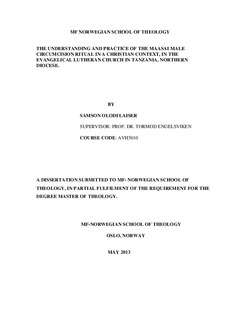The Understanding and Practice of Maasai Male Circumcision Ritual in a Christian Context, in The Evangelical Lutheran Church in Tanzania, Northern Diocese
Abstract
The Maasai is one of the most famous ethnic groups in east Africa. Because their
life of rearing livestock they are moving very rapidly from one place to another. In these
days you can find the Maasai in about every corner of east and central Africa, they are
moving searching for pastures and water for their animals.
The Maasai have many rituals, for example, circumcision, reconciliation,
marriage, and others. In this research I will deal with male circumcision. Male
circumcision is practiced by the Maasai very strongly compared to other rituals. This
ritual is the one which elevates a boy from childhood to adulthood. The man cannot be
allowed to perform any other rituals if he did not pass through circumcision.
The Maasai is a changing society, from their traditional way of living to
Christianity, education and also globalization as stated above. Due to these changes, this
ritual of circumcision is facing many challenges; Maasai Christians are trying to find a
new way of performing it. Those who are not Christians are against this change. In 2012
it was reported several incidents by which Maasai Christians are fighting with Maasai
non-Christians, for example one pastor was beaten by non-Christians during the Sunday
service in one Lutheran parish. In another church during the Sunday service the non-
Christian Maasai youth entered into the church and commanded all Christian youth to go
out of their church so that they could be beaten. Also sometimes those boys who are
circumcised in a Christian way are circumcised again by force by the non-Christian. The
reason why pastors are beaten by the non-Christians is that, they said that pastors are the
ones who are teaching these new ways to their people. The question that I must deal with
is; what is the background, content and meaning of the Maasai male circumcision?
1. Why are the Maasai people attracted so strongly to this practice?
2. Why did the practice of Maasai male circumcision become an obstacle for the
church growth in Maasai church?
3. How should this practice be evaluated from a Christian perspective?
(a) Is this practice wrong or right?
(b) Can Maasai male circumcision be rejected? Can Maasai male circumcision
ritual be accepted?
4. Can the church “Christianize” male circumcision? How can it be related to the
baptism and confirmation? These are the questions which have prevailed and still prevail
in my mind.
